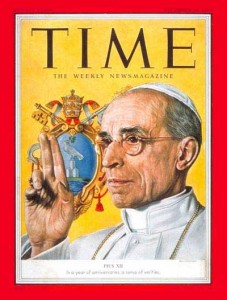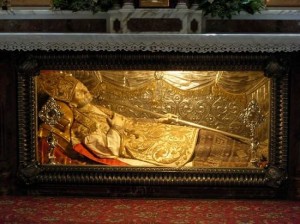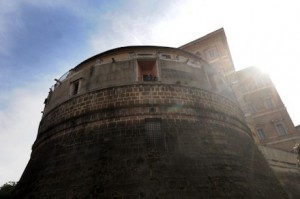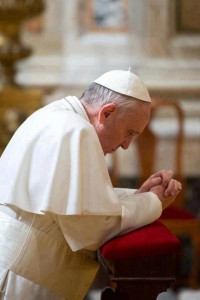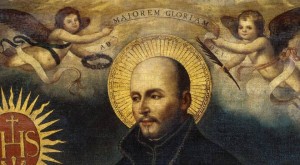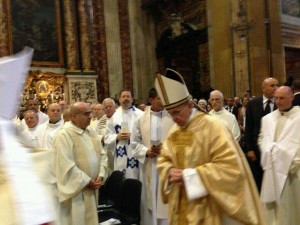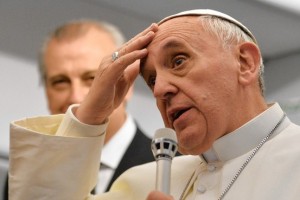 Part I of II of the transcript of the interchange between Pope Francis and the journalists on Sunday’s plane ride to Rome. His Holiness gave journalists an unprecedented, unscripted and and frank responses to their questions. The news people went overboard with the some aspects of the interview, but that’s no surprise for a bunch of people working with churchmen is new. The constant talk about homosexuality is bit much as of now; there is more people want to know of what the Holy Father thinks.
Part I of II of the transcript of the interchange between Pope Francis and the journalists on Sunday’s plane ride to Rome. His Holiness gave journalists an unprecedented, unscripted and and frank responses to their questions. The news people went overboard with the some aspects of the interview, but that’s no surprise for a bunch of people working with churchmen is new. The constant talk about homosexuality is bit much as of now; there is more people want to know of what the Holy Father thinks.
We Catholics follow Jesus Christ, not a bureaucrat, or an organization. Please remember that.
Here’s Part II of the interview. Here’s Zenit’s translation of Part I:
Father Lombardi:
Now, dear friends, we have the joy of having with us on this return trip, the Holy Father Francis. He has been kind enough to give us a good long time to evaluate the trip with us and answer your questions in total liberty. I give him the floor for a brief introduction and then we will begin with the list of those who registered to talk and we will take them from different national and linguistic groups. Now the floor is yours, You Holiness, to begin.
Pope Francis:
Good evening and thank you so much. I am happy. It has been a good trip; it has done me good spiritually. I’m quite tired, but with a joyful heart, and I am well, well: it did me good spiritually. It does one good to meet people, because the Lord works in each one of us; He works in the heart, and the richness of the Lord is such that we can always receive many good things from others. And this does me good. This, as a first evaluation. Then I would say that the kindness, the heart of the Brazilian people is great, is true: its great. They are such kind people, a people that loves celebration, that even in suffering always finds a way to seek the good anywhere. And this is good: they are a happy people, a people who have suffered so much! The joy of Brazilians is contagious, it’s contagious! And these people have a great heart. Then I would say of the organizers, from our part as well as that of the Brazilians – but I felt I was in front of a computer, an incarnated computer … But truly, everything was absolutely punctual, no? But good. Then we had problems with security theories: security here and there; there wasn’t an incident in the whole of Rio de Janeiro in these days, and everything was spontaneous. With less security, I was able to be with the people, to embrace and greet them, without armored cars. It’s the security of trusting people. It’s true that there is always the danger that there is a madman … alas, yes, that there is a madman who does something; but there is also the Lord! But, to make an armored space between the Bishop and the people is madness, and I prefer this madness: [to be] outside and run the risk of the other madness. I prefer this madness: outside. Closeness does good to all.
Then, the organization of the Day, not something specific, but everything: the artistic part, the religious part, the catechetical part, the liturgical part … it was very beautiful! They have a capacity to express themselves in art. Yesterday, for instance, they did very beautiful things, very beautiful! Then, Aparecida. For me Aparecida is an intense religious experience. I recall the Fifth Conference. I was there to pray. I wanted to go alone, somewhat hidden, but there was an impressive crowd! It wasn’t possible [to be hidden], I knew that before arriving. And we prayed, we did. I don’t know … one thing … but also from your part. Your work was, I’m told – I didn’t read the newspapers during these days, I didn’t have the time, I did not watch the TV, nothing –, but I’m told that it was good, good, good work! Thank you, thank you for the collaboration, and thank you for having done this. Then the number, the number of young people. Today – I can’t believe it – but today the Governor spoke of three million. I can’t believe it. But from the altar — that’s true! – I don’t know if you, some of you were at the altar: from the altar, at the end, the whole beach was full, up to the curve, more than four kilometers. But so many young people. And they say, Monsignor [Archbishop] Tempesta told me, that they were from 178 countries: 178! The Vice-President also gave me this number: that’s certain. It’s important! Intense!
Father Lombardi:
Thank you. Now we give the floor first to Juan de Lara, who is from Efe, a Spaniard, and it’s the last trip he makes with us; so, we are happy to give him this possibility.
Juan de Lara:
Good evening, Holiness. On behalf of all our companions we want to thank you for these days you have given us in Rio de Janeiro, the work you have done, and the effort it implies and also in the name of all Spanish journalists, we want to thank you for the prayers and the praying for the victims of the train accident of Santiago de Compostela. Thank you very much. And the first question, — it doesn’t have much to do with the trip, but we take advantage of the occasion that gives us this possibility and I wanted to ask you: Holiness, in these four months of pontificate, we see that you have created several commissions to reform the Vatican Curia. I would like to ask you: What type of reform do you have in mind? Do you contemplate the possibility of doing away with the IOR, the so-called Vatican Bank? Thank you.
[Repeated in Italian]
Pope Francis:
The steps I have taken in these four and a half months, come from two sources: the content of what had to be done, it all comes from the source of the General Congregations that we Cardinals had. They were things that we Cardinals asked for to the one who’d be the new Pope. I remember that I asked for many things, thinking of someone else. That is, we asked, this has to be done … for instance, the Commission of eight Cardinals, we know that it’s important to have an outside consultation, not the consultations that take place, but from the outside. And this is in line – here I make a sort of abstraction, thinking, however, to explain it – in the line increasingly of the maturation of the relation between the Synodality and the Primacy. That is, these eight Cardinals favor Synodality, they help the different episcopates of the world to express themselves in the government itself of the Church. Many proposals were made, which have not yet been put into practice, such as the reform of the Synod’s Secretariat, the methodology; such as the Post-Synodal Commission which has a permanent character of consultation; such as the Cardinals’ Consistories with topics that aren’t so formal – such as, for instance, canonization –, but also subjects, etc. Well, the source of the contents comes from there. The second source is the opportunity. I’ll tell you, it wasn’t hard for me, at the end of the first month of pontificate, to create the Commission of the eight Cardinals, which is one thing … The financial part I thought I’d address next year, because it’s not the most important thing to address. However, the agenda was changed due to the circumstances that you know, which are of the public domain; problems appeared which had to be addressed. The first, the problem of the IOR, namely, how to direct it, how to delineate it, how to reform it, how to heal what has to be healed, and there is the first Commission of Reference, that’s its name. You know the <chirograph>, what is requested, those who make it up, and everything. Then we had the meeting of the Commission of the fifteen Cardinals who are concerned with the economic aspects of the Holy See. They are from all parts of the world. And there, while preparing that meeting, the need was seen to establish a same Reference Commission for the whole economy of the Holy See. That is, the economic problem was addressed outside the agenda, but these things happen when in the office of government, no? One goes here but a goal is kicked from over there and one must intercept it, isn’t that right? Then, life is like this and that is what is lovely about life also. I repeat the question you asked me about the IOR, sorry, I’m speaking in Spanish. Sorry … the answer came to me in Spanish.
[Repeated in Italian]
With reference to that question you asked me about the IOR, I don’t know how the IOR will end; some say that, perhaps, it’s best if it’s a bank, others that it be an aid fund, others say to close it. Alas! These voices are heard. I don’t know. I trust the work of the people of the IOR, who are working on this, also of the Commission. The President of the IOR remains, the same one who was there before; instead the Director and the Vice-Director have resigned. But this, I cannot tell you how this story will end, and this is good also because one finds, one seeks; we are human, in this; we must find the best. But, this yes; but the characteristics of the IOR – whether a bank, an aid fund, whatever it is – must be transparent and honest. This must be so. Thank you.
Father Lombardi:
Many thanks, Your Holiness. So we now pass to a person of the representatives of the Italian group, and we have one whom you know well: Andrea Tornielli, who comes to ask you a question on behalf of the Italian group.
Andrea Tornielli:
Holy Father, I have a question that is, perhaps, somewhat indiscreet: the photograph has gone around the world of you, when we left, going up the steps of the plane carrying a black bag, and there were articles throughout the world that commented on this novelty: yes, of the Pope going up … it never happened, we said, that the Pope went up with his baggage in hand. So, there were even theories about what the black bag contained. Now, my questions are: one, why did you carry the black bag and why was it not carried by a collaborator, and two, can you tell us what was inside? Thank you.
Pope Francis:
It didn’t have the key of the atomic bomb! Alas! I carried it because I’ve always done so: when I travel, I carry it. What is inside? There is my razor, there is the Breviary, there is the agenda, there is a book to read – I took one on Saint Teresina to whom I am devoted. I have always carried the bag when I travel: it’s normal. But we must be normal … I don’t know .. what you are saying is a bit strange to me, that that photo has gone around the world. But we must get used to being normal, the normality of life. I don’t know, Andrea, if I’ve answered you …
Father Lombardi:
So now we give the floor to a representative of the Portuguese language, Aura Miguel, who is from Radio Renascenca.
Aura Miguel:
Holiness, I want to ask you why you ask so insistently that we pray for you? It’s not normal, usual, to hear a Pope ask so much to pray for him.
Pope Francis:
I’ve always asked for this. When I was a priest I asked for it, but not so frequently. I began to ask for it with a certain frequency in my work as Bishop, because I feel that if the Lord doesn’t help in this work of helping the People of God to go forward, one can’t … I truly feel I have so many limitations, so many problems, also being a sinner – you know it! – and I must ask for this. But it comes from within! I also ask Our Lady to pray for me to the Lord. It’s a habit, but it’s a habit that comes from the heart and also from the need I have for my work. I feel I must ask … I don’t know, it’s like this …
Father Lombardi:
Now we pass to the group of the English language, and we give the floor to our colleague Pullella of Reuters, who is here before you.
Philip Pullella:
Holiness, thank you, on behalf of the English group, for your availability. The colleague from Lara has already asked the question we wanted to ask, so I’ll proceed somewhat on those lines, however: in the search to make these changes, I remember that you said to the group of Latin America that there are so many saints that work in the Vatican, but also persons who are somewhat less saintly, no? Have you met with resistance in your desire to change things in the Vatican? Have you found resistance? The second question is: you live in a very austere world, you have stayed in Saint Martha’s, etc. Do you want your collaborators, also the Cardinals, to follow this example and perhaps live in community, or is it something for you only?
Pope Francis:
The changes … the changes come also from two sources: what we Cardinals requested, and what comes from my personality. You were speaking of the fact that I have stayed at Saint Martha’s: but I couldn’t live alone in the Palace, and it’s not luxurious. The papal apartment isn’t so luxurious! It’s ample, big, but not luxurious, but I can’t live alone and with a small tiny group! I need people, to meet people, to talk with people … And because of this the boys of the Jesuit school asked me: “Why do you do it? Out of austerity? Poverty? No, no. Simply for psychiatric reasons, because I can’t cope psychologically. Everyone must carry his life forward, his way of living, of being. The Cardinals who work in the Curia do not live richly and magnificently: they live in an apartment, they are austere, they are austere. Those that I know, the apartments that APSA gives the Cardinals. Then it seems to me there is something else I would like to say. Each one must live as the Lord asks him to live. But austerity – a general austerity – I think is necessary for all of us who work in the service of the Church. There are so many shades of austerity … each one must find his way. In regard to the saints, this is true, there are saints: Cardinals, priests, bishops, Sisters, laymen: people who pray, people who work so much, and also who go to the poor, in a hidden way. I know of some who are concerned with feeding the poor and then, in their free time, go to do their ministry in one or another church … They are priests. There are saints in the Curia. And there are also some who aren’t so saintly, and these are those who make more noise. You know that a tree that falls makes more noise than a forest that grows. And this grieves me when there are these things. But there are some who give scandal, some. We have this Monsignor in jail, I think he’s still in jail, he is not in jail because he resembled Blessed Imelda in fact, he isn’t a Blessed. These are scandals that cause grief. Something – I have never said this , but I recall – I think the Curia has fallen somewhat from the level that it had some time ago, of those old Curia men … the profile of the old Curia man, faithful, who did his work. We are in need of such persons. I believe … they exist, but they are not so many as there were some time ago. The profile of the old Curia man: I would say this. We need more of these. Do I find resistance? Alas! If there is resistance, I haven’t seen it yet. It’s true that I haven’t done so many things, but I can say yes, I have found help, and I have also found loyal people. For instance, I’m pleased when a person says to me: “I’m not in agreement,” and I have found this. “But I don’t see this, I don’t agree: I say it, you do it.” This is a true collaborator. And I’ve found this in the Curia. And this is good. But when there are those who say: “Ah, how good, how good, how good,” but then say the opposite on the other side … Now I can’t remember. Perhaps there are some, but I can’t remember. Resistance: in four months one can’t find so much ….
Father Lombardi:
Well then, we now go to a Brazilian, it seems right to me. Then there is Patricia Zorzan, perhaps Izoard is coming so then we also have a Frenchman.
Patricia Zorzan:
Speaking on behalf of Brazilians. The society has changed, young people have changed, and we see many young people in Brazil. You have spoken to us about abortion, matrimony between persons of the same sex. In Brazil a law has been approved which extends the right of abortion and has allowed matrimony between persons of the same sex. Why didn’t you speak about this?
[Repeated in Italian]
Pope Francis:
The Church has already expressed herself perfectly on this. It wasn’t necessary to go back to this, nor did I speak about fraud or lies or other things, on which the Church has a clear doctrine.
[Repeated in Italian]
Patricia Zorzan:
But it’s an issue that interests young people …
[Repeated in Italian]
Pope Francis:
Yes, but it wasn’t necessary to talk about that, but about positive things that open the way to youngsters, isn’t that so? Moreover, young people know perfectly well what the position of the Church is.
[Repeated in Italian]
Patricia Zorzan:
What is the position of Your Holiness, can you tell us?
[Repeated in Italian]
Pope Francis:
That of the Church. I’m a child of the Church.
[Repeated in Italian]
Father Lombardi:
Now we return to the Spanish group: Dario Menor Torres … ah, sorry, Izoard, whom we already called, so we have one of the French group … and then, Dario Menor.
Antoine-Marie Izoard:
Good day, Your Holiness. On behalf of colleagues of the French language on the flight – we are nine on this flight. For a Pope who is not keen on interviews, we are truly grateful to you. Since March 13, you have introduced yourself as the Bishop of Rome, with very great and strong insistence. So, we would like to understand what the profound meaning is of this insistence, if perhaps more than collegiality there is talk perhaps of ecumenism, for the case of being primus inter pares in the Church? Thank you.
Pope Francis:
Yes, on this we must not go beyond what is said. The Pope is bishop, Bishop of Rome, because the Bishop of Rome is the Successor of Peter, Vicar of Christ. There are other titles, but the first title is “Bishop of Rome,” and everything stems from there. To speak, to think what this means to be primus inter pares, no, this isn’t a consequence of that. It’s simply the Pope’s first title: Bishop of Rome. But there are also others … I think you said something about ecumenism: I believe this favors ecumenism somewhat. But, this alone …

